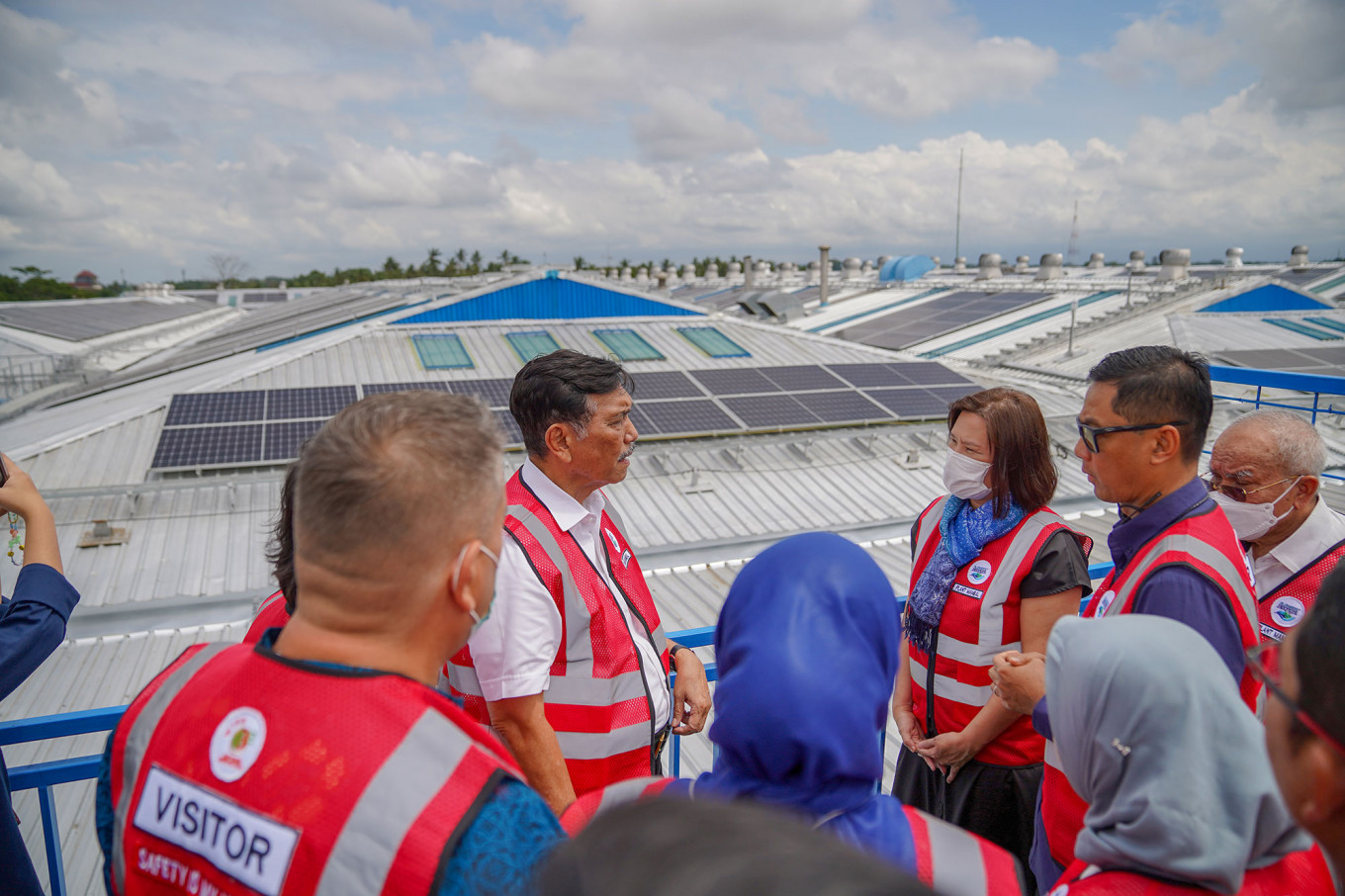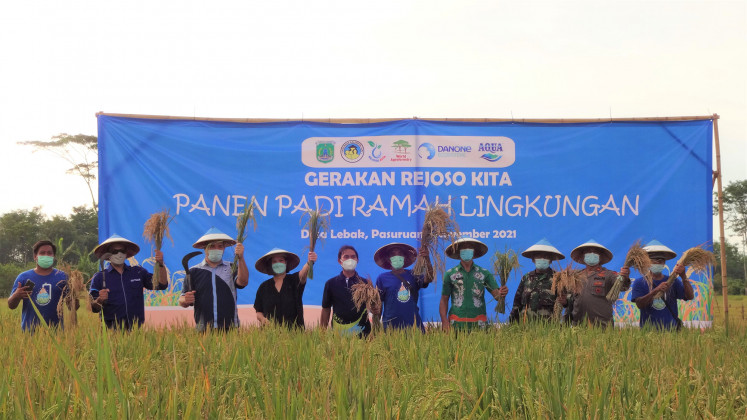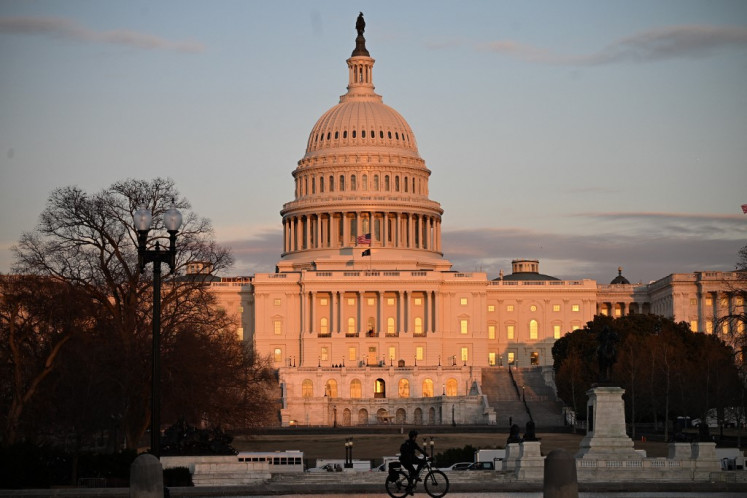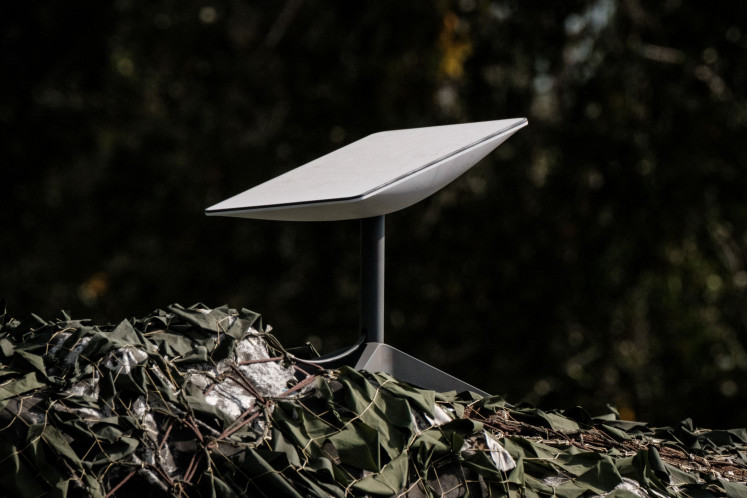Popular Reads
Top Results
Can't find what you're looking for?
View all search resultsPopular Reads
Top Results
Can't find what you're looking for?
View all search resultsMoving Towards Sustainable Development with G20 Momentum
Sustainability is at the core of the upcoming G20 Summit in Bali. With Indonesia taking the presidency this year, the summit will focus on three main issues, one of which is Sustainable Energy Transition.
Change text size
Gift Premium Articles
to Anyone

Sustainability is at the core of the upcoming G20 Summit in Bali. With Indonesia taking the presidency this year, the summit will focus on three main issues, one of which is Sustainable Energy Transition. Noting the need for collaboration between both public and private sector stakeholders, The Jakarta Post spoke with Danone Indonesia CEO Connie Ang on the company’s commitment towards a more sustainable public health and environment.
According to Connie, Danone Indonesia is guided by its “One Planet One Health” vision, noting that the company aims to take on an active role maintaining the health of the people and the environment. “One of the top priorities for us is to help combat climate change and its impacts, including to raise awareness of the risk from increasing use of plastic packaging and the inevitable danger behind climate change. Therefore, we are committed to optimally spread the One Planet One health movement, in the hope that people will participate to create a healthier lifestyle,” she said.
Along with creating awareness on a consumer and community level, “One Planet One Health” is also deeply intertwined with Danone Indonesia’s business and operations. Connie noted that the company is keen to leverage its platform to bring good by preserving the environment, creating a good impact through its products, progressing with its employees and contributing to society.
Beyond buzzwords
Alongside the G20 momentum, Danone Indonesia strives to reduce the impact of its business activities on the environment and surrounding communities by pioneering various sustainability initiatives throughout the years. The company aligns its efforts with sustainable development goals, including providing health and nutrition solution, controlling emissions and energy consumption, water and wastewater management, plastic waste management, green office and environmental assessment for suppliers.
In health and nutrition area, Danone Indonesia has launched the umbrella program named “Bersama Cegah Stunting” (Together Against Stunting) in order to prevent stunting in the country with the approach of specific and sensitive intervention including water access sanitation and hygiene, healthy hydration education, balance nutrition education, stunting prevention action and community education and intervention. “We also try to innovate and develop products that can help consumers get the nutrients that they need. This also showing our tangible commitment to addressing the country’s key health agenda,” added Connie, on how Danone provides solutions. Furthermore, collaboration is also carried out to raise awareness about adequate hydration in the country. Danone Indonesia noted that one in five children and one in four adults are dehydrated. The company aims to offer high-quality hydration products to as many people as possible.
The plastic circular economy model is one solution to the plastic waste problem in Indonesia. Through#BijakBerplastik movement, which began in 2018, Danone-AQUA focus on three core aspects: the development of a waste collection infrastructure, product packaging innovation, and recycling education to our consumers. These three core aspects aim to help us achieve our ambition in 2025 to collect more plastic than we use, to use 100% recyclable, reusable or compostable packaging and to increase the proportion of recycled content in our bottles to 50%.
Danone-AQUA has established various strategic partnerships with national and international partners including start-up companies to encourage innovation in plastic waste collection and public education in order to fulfill the ambition of collecting more plastic rather than to use more. This is in line with the Indonesian government’s target to reduce up to 70 percent of plastic waste in its oceans by 2025.
For its efforts, the company has been awarded the Sustainable Business Award 2022 for Energy Management Category, recognized as a company with a significant achievement in water management, climate change and emission category. Danone Indonesia is also a certified B Corp company, in which a B Corp certification denotes a mark of trust for companies demonstrating high standards of social and environmental performance. “With that being said, it is clear that we really are committed to help create a healthier Indonesia for both the people and the environment.”
In terms of water management, the company has a target to achieve a positive water impact by 2030. “We have succeeded in protecting water resources by planting trees, building infiltration wells, biopores, reducing the carbon footprint and achieving energy efficiency, as well as managing to collect used plastic bottles every year to be produced into plastic bottled drinking bottles. This allows us to become the only bottled water company where 70 percent of its business is circular,” she said.
To date, Danone Indonesia has also succeeded in supporting government initiatives by reducing its energy consumption through optimizing production processes, optimizing usage, and regenerating equipment. It aims to support the government in accelerating the renewable energy target in Indonesia to 23 percent by 2025. Concurring with the G20 Summit, the company has built a fully equipped solar powered factory in Mambal, Bali - a commitment it has pioneered since 2017. Through the Mambal factory, which is Danone Indonesia’s fifth fully solar powered factory in Indonesia, the company is able to reduce 882 tons of CO2 annually. Danone globally is committed to achieving 100% use of renewable electrical energy by 2030, which currently has reached 54%, as well as achieving zero net carbon emissions along its supply chain by 2050. This commitment is realized in Indonesia with the use of solar power plants with a capacity of 6.2 MWp in its Danone-AQUA factories and also the installation of a biomass boiler with a capacity of 6 tons as a steam generator in its Danone Specialized Nutrition factory.
Seizing the momentum
With the G20 Summit fast coming up in November, the spotlight on real actions is brighter than ever. Connie explained that through the G20 momentum, Danone Indonesia underlines the importance of collaboration in creating sustainable development for a better and healthier future. “Together, we believe that we can move forward in building more sustainable business practices that could create a better future for our planet. We will continue to bring positive impacts through our business activities on the environment and surrounding communities by pioneering various sustainability initiatives,” she said.
Connie also emphasizes on what sustainable commitment brings to the business. “For us, sustainability and business should be works hand in hand. There will be no future for the business without sustainability. The brighter future can be achieved with full commitment from all stakeholders involved to become a force for good “.
“In order to achieve the goals, we could seize this G20 momentum to build an ecosystem which supported by integrated and synergized regulation. The synergized regulations must apply at all government levels as they will then allow more contribution, action, awareness, motivation and at the same time scale up participation from the industry players to connect business with sustainability,” she added.
The move to circular economy
When asked about Indonesia’s readiness for a circular economy, Connie is confident, saying that the government continues to push through a sustainability-focused agenda through various policies and initiatives. The issuance of Presidential Regulation No. 97/2017 on the national policy and strategy in reducing and managing household waste and similar household waste details the roadmap that aims to reduce up to 30 percent of household waste and ensure the 70 percent management of household waste by 2025.
According to Connie, the roadmap shows that Indonesia is on the right track, and implementation of the circular economy will help the government to achieve its targets. “However, it also requires active participation from all relevant stakeholders, especially private sectors. We believe that private sectors should become the force for good in creating tangible positive impacts to the people and environment. And we are proud that in Indonesia, we are leading this path through our sustainable initiatives.”
“The shift into a circular economy needs a long process and there is no shortcut for it. Therefore, participation from all elements, synchronization among organizations and uniformed parameters are vital in evaluating the development achievements, not only from the economic aspect but also from the environmental aspect.”
Concluding the interview, Connie expressed her hopes that the people of Indonesia will support and trust Danone Indonesia in its journey to achieve “One Health One Planet” to help make a healthier and a better place for everyone to live in. “Danone Indonesia, together with the government especially during the Indonesia G20 presidency this year, hopes to achieve the best possible outcome toward sustainability, not only for our own needs but also for our next generations. We believe that every time we eat and drink, we can choose the world we live in,” she said.
This article was published in collaboration with AQUA.












